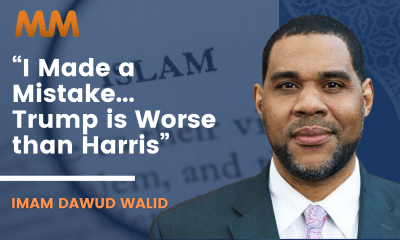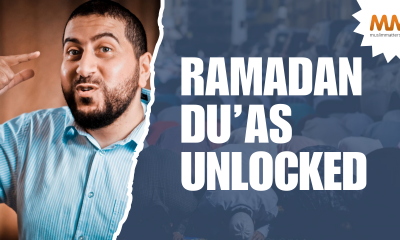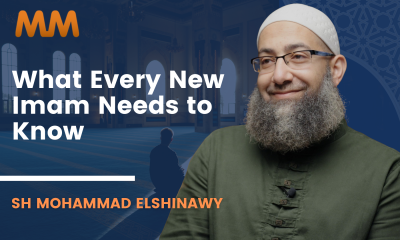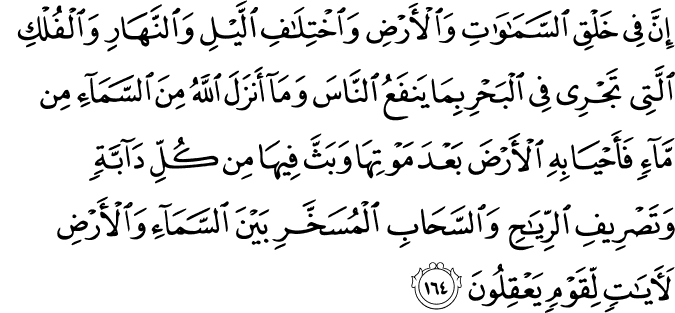#Islam
The Mawlid and the 5 Ms of Confusion: Overcoming Theological Complexes in Our Community
Published

[section_title title=Page 3]
Ten Points For Teachers and Those That Answer Religious Questions:
- Recognize your role is great in the sight of God.
You are transferring to people what you claim to be qualified in — disseminating the will of God in issues related to people’s lives.
“Indeed, We will charge you with a weighty message.” Quran 73:5
Imam Malik used to cry when reading this verse, realizing the great burden and responsibility of disseminating sacred knowledge.
Keep supporting MuslimMatters for the sake of Allah
Alhamdulillah, we're at over 850 supporters. Help us get to 900 supporters this month. All it takes is a small gift from a reader like you to keep us going, for just $2 / month.
The Prophet (SAW) has taught us the best of deeds are those that done consistently, even if they are small. Click here to support MuslimMatters with a monthly donation of $2 per month. Set it and collect blessings from Allah (swt) for the khayr you're supporting without thinking about it.
عن أبي يوسف قال: سمعت أبا حنيفة يقول: لولا الفَرَق ـ أي الخوف ـ من الله أن يضيع العلم، ما أفتيت أحداً؛ يكون له المهنأ، وعليَّ الوِزْر
Abu Yusuf, the student of Imam Abu Hanifah, said, “I heard Abu Hanifah say, ‘if it wasn’t for fearing God from knowledge being lost, I would have never given fatwa to anyone! They enjoy its fruits, and I carry its burden of sin!” (1)
2. Know the reality of people before giving an answer and defer to others who may be MORE aware than you are.
It is widely known by anyone that studies fatwa in any school in the muslim tradition that the most essential universal principle in fatwa taught is: الحكم على الشيء فرع عن تصوره – “Giving a ruling on a matter is simply a branch of understanding its reality.”
Understanding the intricacies of how to deal with converts, indigenous/immigrant community cultural perceptions, details of contemporary financial, medical, psychological, social, educational, administrative, media, or public relations issues, all need a level of awareness that is an absolute must and a pre-condition for fatwa. No doubt a person giving fatwa cannot have mastery of all of these fields nor may be qualified to give counseling in a number of them. Giving an answer without understanding a the questioner’s reality or generalizing a specific scenario to the community, or a general injunction to a specific case can be scholastic dishonesty. A person in the position of advising, giving fatwa, or counseling needs to gauge their own understanding with utmost honesty and either seek the counsel of specialists or defer the issue entirely.
3. Recognize when matters need communal ijtihad.
Issues in Islam are divided in 3 categories when it comes to the affected parties:
A. The general community – issues that deal with the general welfare of all Muslims (and can pertain to all muslims in a particular area).
B. A subset in the community – for example, something particular to converts, or particular to minorities.
C. Individuals – Cases that are based on specific circumstances and require a detailed overview of each individual involved.
Even for scholars, it’s not always correct to give one’s personal opinion, especially in issues of general welfare that deal with an entire community (known as المسائل التي تعم بها البلوى). For these cases it is highly advisable that a community of scholars get together to discuss and conclude in what is called communal ijtihad. On issues that don’t deal with specific individuals and concern the general welfare of the community, there should be a level of responsibility to withhold one’s personal opinions, seek counsel with others, and give communal scholarly direction. Communal ijtihad is stronger than solitary ijtihad in these matters. As for individual cases, a scholar should use their faculties with the aforementioned advice of seeking counsel when required. An individual must seek qualified individuals who understand this delicate and critical balance.
4. Always seek counsel of those older, peers, and those younger in matters.
Seeking counsel may clarify an issue, bring to light a point of view that you may not have thought of, etc. The benefits are innumerable. Even Moses (peace be upon him) was directed to seek counsel from Khadir (peace be upon him). God told him when he thought he was the most knowledgeable of men:
أَوْحَى اللهُ إِلَيْهِ إِنَّ لِي عَبْدًا بِمَجْمَعِ الْبَحْرَيْنِ هُوَ أَعْلَمُ مِنْكَ
“At the junction of two seas there is a servant of Ours who is more learned than you.” Moses then went to seek this man, who was known as Khadir. [Narrated by Bukhari] (2)
5. In matters of differences of opinion, seek to reconcile views. When taking into consideration communal matters, seek to be inclusive of all if possible.
Oftentimes it’s easily done if only one considers how to incorporate multiple views with one answer.
6. If you have the ability to quote a community or body of scholars, it holds more weight than if an individual, solitary opinion is given.
Especially in our time when issues require a group of scholars to reflect over a matter that affects the community. Putting out multiple voices could lead to more confusion as opposed to scholars coming together to speak as one.
7. When presenting your answers, don’t lose sight of the greater objectives of Islam by getting bogged down in the details.
Directing people to seek nearness to God and coming closer to Him in the context of their particular matter is of utmost importance. The person coming to ask a question should be made aware of this. To lose a person in the details of their own question is in opposition to the purpose of sacred knowledge itself. Scholars are those that bring people from the realm of the material to the realm of the divine, even in their mundane actions. If a scholar doesn’t act as a bridge to that understanding, to connecting people to the divine, awakening them to that reality, and bringing them closer to this understanding – then who will?
8. Most importantly, do not lose people by teaching them to disparage over issues of valid disagreement.
Do not make Islam a religion of complexes. Even if there is a disagreement, Islam enjoined characteristics that we must practice. Genuine comradery is often something lacking between groups of students who disagree with one another, because they let these issues make them cultish in nature. Do not privately show discord towards your students over these issues, while publicly maintaining that you are about unity. Be genuine in how you deal with others, seek genuine unity. The people are on the religion of their leaders, and no doubt the leaders of today are their teachers and scholars.
9. Be in the counsel of God, seek nearness to Him, prayer in solitude over matters before speaking on them is essential.
Ibn alQayyim describes the of the scholar in giving fatwa as a signatory and delegate on behalf of God. He says,
إذا كان منصب التوقيع عن الملوك بالمحل الذي لا ينكر فضله، ولا يجهل قدره، وهو من أعلى المراتب السنيات، فكيف بمنصب التوقيع عن رب الأرض والسموات؟ فحقيق بمن أقيم في هذا المنصب أن يعد له عدته، وأن يتأهب له أهبته، وأن يعلم قدر المقام الذي أقيم فيه، ولا يكون في صدره حرج من قول الحق والصدع به؛ فإن الله ناصره وهاديه، وكيف هو المنصب الذي تولاه بنفسه رب الأرباب
“If the virtue of signatories of Kings is something that none can deny as being one of the highest stations a person can reach, then how about the station of the one who signs on behalf of the Lord of the earth and heavens? It’s incumbent on anyone taking a position such as this to prepare for it to their utmost capacity, to assure they fulfill all qualifications, and to fully realize the severity of the level they are placed in. There should not be any wavering in his heart from speaking the truth and defending it. God is his victor and guide, for He himself, the Lord of all lords, is the one who appointed him with such a position.” (3)
If the keys of guidance are appointed by God, then the only way a scholar can access them is by being in constant devotion to Him. A person of knowledge should be in prayer before a matter is solicited from them, while they investigate an answer, before they give an answer, and after an answer is given. As a famous scholar Mutarrif ibn Abdullah mentioned, guidance is a matter of the unseen that God imparts, and the only access to this unseen is through prayer. He said,
“تذاكرت: ما جماع الخير؟ فإذا الخير كثير الصيام والصلاة، وإذا هو في يد الله تعالى، وإذا أنت لا تقدر على ما في يد الله إلا أن تسأله فيعطيك، فإذا جماع الخير الدعاء” .
Mutarrif ibn Abdullah said:
“I reflected over what the source for all good could be. I found that good deeds are many, such as praying and fasting, and they are all in the hands of God. We have no access to what God has except through asking Him, so I realised that the source for all good is prayer (dua’)” (4).
This advice applies to no one more than a scholar and teacher.
10. You are a guide on the path to complete faith in God.
You have to direct people to faith, its objectives, its essence. You have to direct them to the realization of nearness to God, consciousness of Him, love for Him, give hope from their despair, relief from their anxiety, answers to their difficulties, and awareness of how to balance life in their faith.
You have to redirect them if they are lost, guide them through the guidance of God, adjust their perceptions, and solve their confusion. You have to seek the light of God in your answers. You have to bring them from the theology of complexes, from the darkness of ignorance, to the light of true Islam.
In Conclusion
Imam al-Shatibi summarizes beautifully the point of what true knowledge is, and why individual issues are not to be made the central focus of Islam. He mentions how, rather, they are a means to applying and understanding the true objectives of Islam.
العلم وسيلة من الوسائل ليس مقصودا لنفسه من حيث النظر الشرعي وإنما هو وسيلة إلى العمل ، وكل ما ورد في فضل العلم فإنما هو ثابت للعلم من جهة ما هو مكلف بالعمل به، فلم يثبت فضل العلم مطلقا ، بل من حيث التوسل به إلى العمل “
He says,
“Knowledge through the lens of sacred legislation is a means and is not to be intended in and of itself. Rather it’s a means to action. All that has been narrated regarding the virtues of knowledge has been established because knowledge renders a person responsible to act upon it. Knowledge in and of itself is not virtuous, but its virtue is that it’s a means that leads to action.”
“”أن عامة المشتغلين بالعلوم التي تتعلق بها ثمرة تكليفية تدخل عليها الفتنة والخروج عن الصراط المستقيم ويثور بينهم الخلاف والنزاع المؤدي إلى التقاطع والتدابر والتعصب حتى تفرقوا شيعا ، وإذا فعلوا ذلك خرجوا عن السنة ولم يكن أصل التفرق إلا بهذا السبب ، حيث تركوا الاقتصار من العلم على ما يعني وخرجوا إلى ما لا يعني ، فذلك فتنة على المتعلم والعالم وتعطيل للزمان في غير تحصيل “
” كل علم لا يفيد عملا فليس في الشرع ما يدل على استحسانه ولو كان له غاية أخرى شرعية لكان مستحسنا شرعا “
“كل علم شرعي – مشروع – فطلب الشارع له إنما يكون حيث هو وسيلة إلى التعبد به لله تعالى لا من جهة أخرى فإن ظهر فيه اعتبار جهة أخرى فبالتبع والقصد الثاني لا بالقصد الأول”
And he says,
“Those who busy themselves with the different sciences that may have a legislative benefit are susceptible to trial and distancing from the straight path. It may even lead some people to differences and disparagement that could lead to separation, discord, hostility, and enmity until they split to groups. If this happens then they’ve left the Sunnah because the origin of this separation isn’t anything except due to these reasons. They left off knowledge that would benefit them to that which doesn’t concern them. This is all just a trial for the student, teacher, and wasting time with no gain.”
And he says, “All sacred knowledge is legislated because it’s a means to the servitude and worship of God, the Exalted.” (5)
Ibn Ashur says, “Knowledge that people seek to attain, regardless of those prior to us or in our times, seeks to achieve certain goals: either rectifying thought to prevent mistakes in reflecting how to achieve any given objectives, or rectifying actions so that that when trying to build functionality it saves a worker from committing mistakes. Therefore, no doubt the objective of encouraging attaining knowledge was in order to rectify thought or action, seek a means to rectifying theology, and to bring about positive psychological influence.” (6)
In turn al-Ghazali discussed the dangers of losing sight of this objective:
من جملة ما نصح به رسول الله صلى الله عليه وسلم أمته قوله ” علامة إعراض الله تعالى عن العبد اشتغاله بما لا يعنيه ، وإن امرأ ذهبت ساعة من عمره في غير ما خلق له لجدير أن تطول عليه حسرته ، ومن جاوز الأربعين ، ولم يغلب خيره شره فليتجهز للنار”.وفى هذه النصيحة كفاية لأهل العلم.
He says, “From the comprehensive advice that the Messenger of Allah (peace be upon him) advised his nation with, ‘A sign of the turning away of God from a servant is that they are busied with that which does not concern them.’ A person may spend one hour of their life in something they weren’t created for and that may qualify them to receive prolonged regret…’ and this advice is sufficient for people of knowledge.” (7)
And he wrote in Ihya ‘Ulum alDin the conclusion of his advice to those disseminating knowledge as well as those seeking answers.He says:
وتأمل فيما يعنيك مما بين يديك ودع عنك ما سواه والسلام
وقد رأى بعض الشيوخ بعض العلماء في المنام فقال له ما خبر تلك العلوم التي كنت تجادل فيها وتناظر عليها فبسط يده ونفخ فيها وقال طاحت كلها هباء منثورا وما انتفعت إلا بركعتين خلصتا لي في جوف الليل
وفي الحديث: (( ما ضل قوم بعد هدى كانوا عليه إلا أوتوا الجدل)). ثم قرأ: ]ما ضربوه لك إلا جدلا بل هم قوم خصمون[ (الزخرف: 58) وفي الحديث في معنى قوله تعالى: ] فأما الذين في قلوبهم زيغ [ الآية (آل عمران: 7) (( هم أهل الجدل الذين عناهم الله بقوله تعالى ((فاحذرهم)).
وقال بعض السلف: يكون في آخر الزمان قوم يغلق عليهم باب العمل ويفتح لهم باب الجدل. وفي بعض الأخبار: (( إنكم في زمان ألهمتم فيه العمل وسيأتي قوم يلهمون الجدل)). وفي الخبر المشهور: (( أبغض الخلق إلى الله تعالى الألد الخصم)). وفي الخبر: ((ما أتى قوم المنطق إلا منعوا العمل))
والله أعلم”.
“… And reflect over what concerns and benefits you of what you have in front of you. Leave everything else beside it. Wasalam.
Some of our teachers saw scholars in their dreams, and they asked them, ‘what’s the outcome of those matters which you used to argue and debate over?’ They stretched out their hand and blew on them and said, ‘they have become scattered like dust and we didn’t benefit from any of it. I rather benefitted from praying two rak’at (units) of prayer that I did sincerely in the middle of the night.”
This is as is narrated in the hadith, ‘No people go astray after having been granted guidance except in indulging in argumentation. Then the Prophet (peace be upon him) recited the verse “… They raise do not raise objections except for argument. Nay! But they are a quarrelsome people’ (Quran 43:58). [Narrated by Ibn Majah and Tirmidhi]
And also the hadith, ‘regarding the saying of God, ‘As for those in whose hearts is deviation (Quran 3:7),’ They are those who dispute and are those whom Allah has referred to here, so beware of them. [Narrated by Bukhari, Muslim, Ibn Majah, and others].
And some of the pious predecessors said, ‘toward the end of time there will come people who will have the door of doing deeds closed upon them and they rather lean toward the door of argumentation.’
And in other narrations, ‘you are in a time where you aspired to do deeds, and there will come a time where people will aspire for argumentation.’And in the famous narration, ‘Of the most hated people in the sight of God is a ruthless argumentative person’ [Narrated by Bukhari and Muslim].
And in the narration, ‘A people don’t indulge in philosophical discourse except that they’re prevented from action.’ ” (8)
Ibn Taymiyyah said that if one considers all of this it should result in developing the central purpose and essence of Islam, of building love for God and His servitude.
He says:
كلما ازْدَادَ الْقلب حبا لله ازْدَادَ لَهُ عبودية، وَكلما ازْدَادَ لَهُ عبودية ازْدَادَ لَهُ حبا وحرية عَمَّا سواهُ
“The more the heart increases in love for God, it increases in servitude to Him. And the more one increases in servitude to Him, love, and freedom from any other attachment besides Him increases.” (9)
All of this, can be beautifully summarized, in a single hadith of the Prophet  who said:
who said:
مِنْ حُسْنِ إِسْلَامِ اَلْمَرْءِ, تَرْكُهُ مَا لَا يَعْنِيهِ“From the perfection of a person’s Islam, is that they leave that which does not concern them.” [Narrated by Tirmidhi and Ibn Majah]
Ibn Rajab said that the statement of the Prophet  “What doesn’t concern a believer,” means “Anything that busies a person from an application of the essence of Islam in seeking its objectives to develop higher stages of spirituality that leads one to perfect one’s relationship with God to the level of awareness, with others in developing lofty character and manners, with oneself in living a balanced life to reach inner peace.”’ (10)
“What doesn’t concern a believer,” means “Anything that busies a person from an application of the essence of Islam in seeking its objectives to develop higher stages of spirituality that leads one to perfect one’s relationship with God to the level of awareness, with others in developing lofty character and manners, with oneself in living a balanced life to reach inner peace.”’ (10)
And if we were to look at one practical example of a perfect relationship between a scholar and a seeker to show how all of what has been mentioned in this true essence of Islam works, there’s an amazing story between al-Shafi’i and one of his most famous students, al-Muzani, which exemplifies it perfectly.
قال أَبُو يَحْيَى زَكَرِيَّا السَّاجِيُّ، حَدَّثَنَاالمُزَنِيُّ، قَالَ: قُلْتُ: إِنْ كَانَ أَحَدٌ يُخْرِجُ مَا فِي ضَمِيرِي، وَمَا تَعَلَّقَ بِهِ خَاطِرِيق مِنْ أَمْرِ التَّوْحِيْدِ فَالشَّافِعِيُّ، فَصِرْتُ إِلَيْهِ،
وَهُوَ فِي مَسْجِدِ مِصْرَ،فَلَمَّا جَثَوْتُ بَيْنَ يَدَيْهِ،
قُلْتُ: هَجَسَ فِي ضَمِيرِي مَسْأَلَةٌ فِي التَّوْحِيْدِ، فَعَلِمْتُ أَنَّ أَحَداً لاَ يَعْلَمُ عِلْمَكَ، فَمَا الَّذِي عِنْدَكَ؟
فَغَضِبَ،
ثُمَّ قَالَ: أتَدْرِي أَيْنَ أَنْتَ؟
قُلْتُ: نَعَمْ.
قَالَ: هَذَا المَوْضِعُ الَّذِي أَغْرَقَ اللهُ فِيْهِ فِرْعَوْنَ.أَبَلَغَكَ أَنَّ رَسُوْلَ اللهِ -صَلَّى اللهُ عَلَيْهِ وَسَلَّمَ- أَمَرَ بِالسُّؤَالِ عَنْ ذَلِكَ؟
قُلْتُ: لاَ.
قَالَ: هَلْ تَكَلَّمَ فِيْهِ الصَّحَابَةُ؟
قُلْتُ: لاَ.
قَالَ: تَدْرِي كَمْ نَجْماً فِي السَّمَاءِ؟
قُلْتُ: لاَ.
قَالَ: فَكَوْكَبٌ مِنْهَا: تَعْرِفُ جِنْسَهُ، طُلُوْعَهُ، أُفُولَهُ، مِمَّ خُلِقَ؟
قُلْتُ: لاَ.
قَالَ: فَشَيْءٌ تَرَاهُ بِعَيْنِكَ مِنَ الخَلْقِ لَسْتَ تَعْرِفُهُ، تَتَكَلَّمُ فِي عِلْمِ خَالِقِهِ؟!
ثُمَّ سَأَلَنِي عَنْ مَسْأَلَةٍ فِي الوُضُوْءِ، فَأَخْطَأْتُ فِيْهَا، فَفَرَّعَهَا عَلَى أَرْبَعَةِ أَوْجُهٍ، فَلَمْ أُصِبْ فِي شَيْء مِنْهُ.
فَقَالَ: شَيْءٌ تَحْتَاجُ إِلَيْهِ فِي اليَوْمِ خَمْسَ مَرَّاتٍ، تَدَعُ عِلْمَهُ، وَتَتَكَلَّفُ عِلْمَ الخَالِقِ، إِذَا هَجَسَ فِي ضَمِيرِكَ ذَلِكَ، فَارْجِعْ إِلَى اللهِ، وَإِلَى قَوْلِهِ تعَالَى: {وَإِلَهُكُمْ إِلَهٌ وَاحِدٌ لاَ إِلهَ إِلاَّ هُوَ الرَّحْمَنُ الرَّحِيْم * إِنَّ فِي خَلْقِ السَّمَاوَاتِ وَالأَرْضِ وَاخْتِلَافِ اللَّيْلِ وَالنَّهَارِ وَالْفُلْكِ الَّتِي تَجْرِي فِي الْبَحْرِ بِمَا يَنفَعُ النَّاسَ وَمَا أَنزَلَ اللَّهُ مِنَ السَّمَاءِ مِن مَّاءٍ فَأَحْيَا بِهِ الْأَرْضَ بَعْدَ مَوْتِهَا وَبَثَّ فِيهَا مِن كُلِّ دَابَّةٍ وَتَصْرِيفِ الرِّيَاحِ وَالسَّحَابِ الْمُسَخَّرِ بَيْنَ السَّمَاءِ وَالْأَرْضِ لَآيَاتٍ لِّقَوْمٍ يَعْقِلُونَ} [البَقَرَةُ: 163 و 164]
فَاسْتَدِلَّ بِالمَخْلُوْقِ عَلَى الخَالِقِ، وَلاَ تَتَكَلَّفْ عِلْمَ مَا لَمْ يَبْلُغْهُ عَقْلُكَ.
قَالَ: فَتُبْتُAl-Muzani said: “ ‘If there ever was a person that could bring out what I was thinking and help me clear my thoughts on an issue in theology it was al-Shafi’i. I went to him while he was in a Masjid in Egypt. When I sat in front of him, I said: There is something bothering me on an issue of theology and I know that no one matches you in knowledge, so what do you have for me?
He became angry and said: ‘Do you know where you are?’
I said: ‘Yes.’
‘This is the place where God drowned Pharaoh,’ He said, ‘Did anything reach you from the Messenger of God that he ordered us to ask about it?’
‘No,’ I replied.
‘Did the companions speak about it?’
‘No,’ I replied.
‘Do you know how many stars are in the sky?’
‘No,’ I replied.
‘Or how many of them are planets? Do you know their types, their rising and setting, what they are made of?’
‘No,’ I replied.
‘So something you see with your own two eyes you don’t know,’ al-Shafi’ said, ‘but you want to speak about the knowledge of its creator?!’
He then asked me about an issue in Wudu (purity)’. I answered, but answered incorrectly.
He then gave me the four possible answers to his question, my previous answer not being one of them.
He then said, ‘Something that we need every single day five times, you leave studying to burdening yourself with theories about your Creator simply because it crosses your mind? Return to God and to his statement:
“Your God is One, there is no one God except Him, the Lord of Mercy, the Giver of Mercy. In the creation of the heavens and earth; in the alternation of night and day; in the ships that sail through seas with goods for people; in the water which God sends down from the sky to give life to the earth when it has been barren, scattering all kinds of creatures over it; in the changing of winds and clouds that run their appropriated courses between the sky and the earth: there are signs in these for those who use their minds.” (Quran 2:163-164)
The creation is evidence of the Creator, don’t overburden your mind with issues that are beyond your understanding.
Al-Muzani said:‘So I repented.’ ” (11)
In essence all of these points are for the average person, teacher, and scholar to consider! This is what the true objectives of faith should lead to, and this is what a complex of making faith about issues deter from! Let us escape from the mentality of the religion of complexes that shackle us by the issues. Let us not be those that are confined by the matters that divided us and realize that they are but a means to the mutual goal we seek to attain. Let the issues be a means to connect with the divine. Let the teachers and scholars call to it, as Imam al-Shafi’i did, and let us as people realize it. Let us not teach, preach, and live in the confines of the 5 Ms of confusion… let us seek the freedom of servitude to the divine.
God help us all and bless us to reach that objective in His company through His remembrance in this life, and in the next with nearness to Him and the companionship of the Prophet (peace be upon him) and the righteous. Ameen.
As a final disclaimer: the intention of this article was not to conflate getting answers on these issues or any given issue in Islam, or repress discussion. In fact that wasn’t the point at all. Having studied Islamic law for a period of time the goal of this was definitely not to disregard the importance of our community getting answers as much as it was on how we deal with these issues, as well as giving guidance to the many lost individuals out there.
I grew up in a time when there was much more friction among Muslims on these and many other issues, and know what it feels like for the 90% of Muslims out there just wanting to understand Islam, know how to practice it, how to come nearer to God, get some of their confusion cleared up and personal questions catered to without all of the headache. Especially in these times when we are being forced to overcome differences due to dealing with more pressing matters, let us further cater to the primary objectives of our faith rather than lose those in search of balancing their life with faith.
References and Further Reading
- آداب الفتوى – النووي رحمه الله 1/16
- تفسير القرآن العظيم – ابن كثيررحمه الله 9/180, صحيح البخاري 3400
- 1/16-17 إعلام الموقعين- ابن القيم رحمه الله
- الزهد – الإمام أحمد رحمه الله 1330
- الموافقات – الشاطبي رحمه الله 1/60 و قسم الإجتهاد م5
- النظام الإجتماعي في الإسلام – محمد طاهر بن عاشور رحمه الله 84
- أيها الولد – الغزالي رحمه الله 94-93
- إحياء علوم الدين- الغزالي رحمه الله 52-51
- العبودية – ابن تيمية رحمه الله 97
- جامع العلوم و الحكم – ابن رجب رحمه الله 218-207
– The Compendium of Wisdom and Knowledge – Turath – Ibn Rajab (Translated by: Abdassamad Clarke) - سير أعلام النبلاء – الذهبي رحمه الله 10/31
مقدمة المجموع شرح المهذب – النووي رحمه الله –
– Its translation: Translation of Chapter Five of the Introduction to al-Nawawī’s al-Majmūʿ: The Etiquettes of a Fatwā, the Muftī, and the One Seeking a Fatwā – Islamic Sciences, Vol. 11 (Winter 2013) No. 2 – Mahdi Lock
677-768 الفقيه و المتفقه – الخطيب البغدادي رحمه الله
How to Disagree – Salman al-Oadah
Keep supporting MuslimMatters for the sake of Allah
Alhamdulillah, we're at over 850 supporters. Help us get to 900 supporters this month. All it takes is a small gift from a reader like you to keep us going, for just $2 / month.
The Prophet (SAW) has taught us the best of deeds are those that done consistently, even if they are small. Click here to support MuslimMatters with a monthly donation of $2 per month. Set it and collect blessings from Allah (swt) for the khayr you're supporting without thinking about it.
Hasib Noor is an instructor and researcher that specializes in History, Islamic Heritage & Law, alongside other Islamic disciplines. Founder of Prophetic Legacy & Foundation dedicated to researching and teaching Islamic history, heritage, and archaeological sites. He resides in Madinah.


When Love Hurts: What You Need to Know About Toxic Relationships | Night 11 with the Qur’an

I Can’t Stop Thinking About Someone | Night 10 with the Qur’an

Fifteen Years in the Shadows: The Strategic Brilliance of the Hijrah to Abyssinia

Ramadan As A Sanctuary For The Lonely Heart

Cultivating A Lifelong Habit Of Dua In Children

30 Nights with the Qur’an: A Ramadan Series for Muslim Teens

[Podcast] Guardians of the Tradition: Muslim Women & Islamic Education | Anse Tamara Gray

Who Am I Really? What Surat Al-‘Asr Teaches Muslim Teens About Identity | Night 1 with the Qur’an

Where Does Your Dollar Go? – How We Can Avoid Another Beydoun Controversy

Ramadan In The Quiet Moments: The Spiritual Power Of What We Don’t Do

I Can’t Stop Thinking About Someone | Night 10 with the Qur’an

When to Walk Away from Toxic Friends | Night 9 with the Qur’an

What Islam Actually Says About NonMuslim Friends | Night 8 with the Qur’an

Week 1 in Review: Is Your Teen Actually Changing? | Night 7 with the Qur’an

Why Your Teen Wants to Change Their Muslim Name | Night 6 with the Qur’an
Trending
-

 #Islam2 weeks ago
#Islam2 weeks ago30 Nights with the Qur’an: A Ramadan Series for Muslim Teens
-

 #Current Affairs1 month ago
#Current Affairs1 month ago[Podcast] Should Muslims Ally with Conservatives or Progressives? | Imam Dawud Walid
-

 #Islam1 month ago
#Islam1 month agoHow to Make this Ramadan Epic | Shaykh Muhammad Alshareef
-

 #Life1 month ago
#Life1 month ago[Podcast] The Parts of Being an Imam They Don’t Warn You About | Sh Mohammad Elshinawy






GregAbdul
December 18, 2015 at 1:42 AM
May Allah forgive me, but we need to be honest. there is no group of Muslims hating other Muslims because they do not celebrate Mawlid. There are some intolerant Hanafis, but most, if they are educated are not. Non Muslims love to jump on Salafis and I met a brother who was so good and he was Salafi so I don’t like to say they are all bad, but there are many of them off the deep end and totally in love with all things Saudi. It’s like the Shia. If someone is hating you, but you are not hating them or what they like, it’s not fair to call the disagreement two-sided.
Mustafa
December 19, 2015 at 1:08 AM
Shia, Sufi, Barelvi and so on. The all commit practices I consider deviated(like Mawlid). But in this age where the best to walk the earth is more slandered and abused then ever before I can’t help but appreciate the intention behind what they do. As wrong as I consider them I recognize we are brethren of one Ummah who testify la ilaha illAllah Muhammadur Rasulullah, we pray salah in a similar form to the Messenger sallahualayhiwasalam in the direction of the Qibla and agree on the basics like the finality of Islam, it being the only path to Jannah along with deeds to accompany it.
In this age of tribulation and strife I think one way forward is to show Allah “I united with other Muslims on every front possible.” Where we can agree, lets remain in agreement and thank Allah we haven’t disagreed further than it. I recently read that there are something like 40 thousand(yes 40k!!!) different Christian groups. Alhamdulilah we have far fewer disagreements and when we do disagree it is usually over issues that aren’t of the absolute minimum.
There isn’t any doubt that these are all serious issues because everything legislated by Allah is a serious matter. But so is unity and if we can tell Allah “we did the minimum required we were commanded by you to stick together” then that’s one more responsibility we fulfilled before the we leave the earth.
We Muslims are commanded to obey Allah and His Messenger and that Muslims are passionate about these issues is no doubt a good thing insha Allah because it’s coming from a good place. The 5 M’s all have to do with what Allah and His Messenger commanded. However sticking together and unity is from the commandments of Allah and His Messenger so where we agree on the truth we ought to stick together.
May Allah guide us and save us from all evil!!!
Jamshed Hasan
March 24, 2016 at 1:00 AM
Assalamu Alaikum,
Ya Nabi Salam- Alaika for everyday.. every moment of our time…as Allah and His Angels are sending Durud and Salam all time….with all respect and love.. Mohammad SAW is the Mercy of Creation…
Sura Al-Azhab – Ayat 56, please read and research , Mawlid, Reciting durud, Kiyam, Nasid, any praising, Salam, durud is for everyday , we should fast on every Monday as this is great Sunnah as well.
” Inna Allaha wamalaikatahu yusalloona AAala alnnabiyyi ya ayyuha allatheena amanoo salloo AAalayhi wasallimoo tasleeman”
Meaing: Undoubtedly, Allah and His angels send blessings on the prophet the Communicator of unseen news, O you who believe! Send upon him blessings and salute him fully well in abundance.
English (Yusuf Ali): (Recite)
33:56 Allah and His angels send blessings on the Prophet: O ye that believe! Send ye blessings on him, and salute him with all respect.
Mahamoud Haji
December 18, 2015 at 3:27 AM
Jazakallah Kheir Brother Hasib. Weighty matter indeed in an age of confusion, intolerance and labeling. Ultimately it is the seeking of true knowledge with the aid of Allah, and not blind following, that will free us. May Allah guide us to the right path.
Blog Islam Barcelona
December 18, 2015 at 6:37 PM
Interesting,
Thank you!
Habeeb
December 21, 2015 at 5:56 AM
We are Muslims Canadians and love and respect all Muslims alike and tolerant to all faiths and cultures alike like Madina. Thanks
FM
December 21, 2015 at 9:06 AM
You lost me as soon as you started to preach that thorny “who has authority” and then lamenting lay Muskkms like me on our shortcomings. We hear this everyday anyway. What we need is questioning of “authorities” on promoting cult like thinking. What do you do when one “authority” says that the other “authority” actually has no authority? How do we know who do we trust?
Yes, we need specialties and we go to professionals to seek answers when we need them as you stated in your piece but we are not legally or morally bound to accept their professional advices. They are no “go between” between us and a supreme being.
Just two days ago I read the fatwa from a very respected looking scholar that those who celebrate Mawlid are evil and Satanic. Now, I am against celebrating Mawlid as well but just as overwhelming majority of lay Muslkms do in these situations, I do not have any problem with those who do. In fact, I have attended quite a few on the invitation of friends who do celebrate. So now based on the evidence from this scholarly opinion, I am supposed to believe that those who are celebrating Mawlid are evil and satanic? Okay, I won’t but there will be many others who will. And do I have the right to challenge this scholarly authority? Or I would be told in step 1 that “you do not have the authority” or “you cannot understand the deen because you do not possess the KNOWLEDGE, so you should surrender to this fatwa”. What is the mechanism for lay people like us to challenge the authorities? And are they ever taught to listen to these challenges with open mindedness even if it means questioning what they have believed?
i can go on and on but the point is that no real change can come in the Muslim community until either the authorities change or the community makes them accountable for what they say and how they act without the fear of being called “kafir” or “astray Muslim” (later is only a kinder way of saying the former), or in worst cases, fear of getting a permit to hell by a so called riteous Muslim who wouldn’t mind taking the fatwa against you to the next level where you don’t deserve to live anymore.
I hope this will be published but I have my doubts based on past experiences :)
Mustafa Mahmud
December 21, 2015 at 10:34 AM
Fuqaha are not what they used to be. Nowadays an actual heresy will run rampant and some daees, scholars will be ranting about raf ya dayn which is a fiqh issue or mawlid which they strongly believe to be innovative.
On Al Jumuah (website) there is a good article on how it is absurd to blame laymen alone and excuse certain members of the religious classes.
Mustafa Mahmud
December 21, 2015 at 10:37 AM
BTW I strongly believe Mawlid should be avoided but subhanAllah we’ve got an onslaught of kuffar telling us to not give our Messenger his due status, to abandon Sharia to believe that they can go to Jannah and more.
Refute mawlid raf ya dayn or whatever. But for God sake take some time out to talk about what is actually relevant and of far greater severity(kufr vs bidah it isn’t hard to tell.)
Yacoob Vahed
December 23, 2015 at 11:17 PM
I think it was Ali (RA) who said that when people know a little about something they concentrate on the minor issues.
Let’s look at the Bigger Picture always – we will then learn to appreciate the good and leave out the small differences with respect and dignity. We should however always strive to practice evidence-based Islam but always remember the TOLERANCE and CHARACTER of the Prophet (SAW) when guiding others. Let’s have Mercy unto one another and unite against the Kuffaar as the Quraan instructs us to do. Look at the overall good in the Muslim and inshaAllah he/she will learn from you without your instructions.
Steven
December 23, 2015 at 11:49 PM
Perhaps the problem is that so many people are seeking to learn about the religion in order to use it to chastise others instead of learning it to increase their chances of entering paradise. If we really wanted to make it into paradise we would never, with all our faults, have the time to worry about what others are doing.
M.Mahmud
December 24, 2015 at 10:25 PM
Muslims are commanded to simultaneously enjoin on what is right and forbid what it wrong, to affirm what is true and to reject what is false, all while fearing for ourselves and for others.
This is the way of the Messengers and whoever followed guidance.
javaid
January 8, 2016 at 10:14 PM
I was relatively tolerant of Mawlid even though I considered it a Bidah. I was tolerant because I thought to myself that they do it for the love of Prophet(sa) and because we had more things to worry about.
But I realized that Mawlid celebrations are getting insane by every passing year with huge cakes, models of Madinah, disco songs, even inviting women-dancers and what not. Now I think that Mawlid is a Munkar which must be warned against and stopped. Not just ignored.
Another fact to mention is that some people quote Ibn Hajar Asqalani and others, even by their standards and by the standards of the genuine classical scholars who allow this, the Mawlid of today is a far bigger deal and clearly a Munkar.
Ghufran Ali Muzaffar
January 20, 2016 at 12:23 AM
Its a great blog and really leraned alot from this blog. I think Their is another M you should include and that is “Money”. Which is the biggest cause for discrimination between different sects and culture
Ali
July 1, 2016 at 4:44 AM
As Salaamu Alaikum
The Purpose of the Kuffar was to divide and conquer and they have successfully done so!
As we see the Muslims being constantly defeated by the western forces today, as well constantly arguing amongst one another!
The current Saud Family is a tribal Family put in power by the Kuffar, remember that tribalism is forbidden in Islam, the split began with Abdul ibn Wahhab, he was the one who caused the rift which lead to the Ottomans leaving Arabia and the beginning of the SalafI movement.
If Islam was the way the Saudis are running the blessed Cities than Nabi Muhammad (saw) would have elected Hazrath Ali as the 1st Caliph and it would have stayed within the family of Muhammad peace be upon upon.
Islam is about Just and fairness not who has the most money will be in power!
Alex
May 21, 2020 at 9:14 AM
Salam aleykum.
Very interesting post.
Thanks!